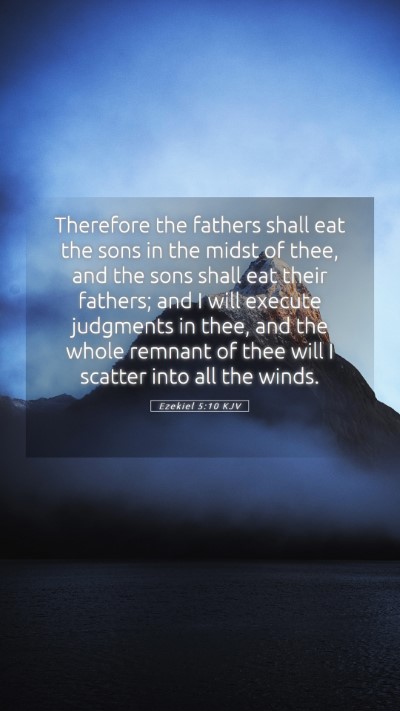Ezekiel 5:10 Bible Verse Meaning and Interpretation
Ezekiel 5:10 presents a striking and somber message within the broader narrative of the Book of Ezekiel. In this verse, the implications of sin, judgment, and the consequences of idolatry are articulated in a manner that serves both as a warning and a declaration of God's sovereignty.
Verse Text
"Therefore the fathers shall eat the sons in the midst of thee, and the sons shall eat their fathers; and I will execute judgments in thee, and the whole remnant of thee will I scatter into all the winds." (Ezekiel 5:10, KJV)
Analysis and Commentary
The verse reflects a scenario where the extreme consequences of a nation's sin are depicted through shocking imagery of familial cannibalism, suggesting the depths of despair and the breakdown of social order that comes as a result of God's judgment.
Understanding the Context
To grasp the full weight of Ezekiel 5:10, it is essential to understand the historical and cultural context of the time:
- The Israelites were in a state of rebellion against God, engaging in idolatry and other sins that warranted divine judgment.
- Ezekiel's prophetic ministry took place during the Babylonian exile, a time of tremendous trial for the Jewish people.
- This verse serves as a part of God's prophetic declarations through Ezekiel, emphasizing the severity of the consequences that would ensue for their unfaithfulness.
Matthew Henry's Commentary
Henry interprets this verse as a depiction of the total devastation that would befall the people as a direct result of their sin. He emphasizes that such dire conditions symbolize not only physical suffering but also spiritual abandonment by God, which Israel faced due to their persistence in sin. His commentary brings to light the necessity of returning to God's ways to avert such catastrophic outcomes.
Albert Barnes' Insights
Barnes elaborates on the metaphorical language used in this verse. He notes that the imagery of cannibalism speaks to the utter desperation that would consume the people when God’s protective hand is removed. He stresses that this was intended to shock the people and make them aware of their spiritual standing before God, illustrating the totality of their impending judgment.
Adam Clarke's Explanation
Clarke provides a detailed examination of the verse, indicating that the prophetic declaration is a severe warning about the potential future faced by the Israelites. He posits that such famine and strife could lead to extreme self-preservation behaviors, such as cannibalism, highlighting the extent of the spiritual and physical devastation that is expected as a result of their collective sins.
Spiritual Implications
This verse serves as a powerful reminder of the spiritual principles at play:
- The consequences of Sin: The verse starkly warns about the severe outcomes that follow a life turned away from God.
- The nature of Judgment: It illustrates that God’s judgment can lead to tragic physical and spiritual situations.
- Hope Through Repentance: While the verse portrays despair, it also encourages a return to faithfulness, as God is always open to restoration.
Cross References
This verse resonates with several related scriptures:
- Deuteronomy 28:53-57 - This passage discusses the curse that would fall upon disobedient Israel, indicating similar themes of desperation.
- Jeremiah 19:9 - Another reference to the horrific consequences of idolatry resulting in such extreme behaviors.
- Lamentations 2:20 - Reflects the suffering experienced by Jerusalem in the context of God’s judgment.
Conclusion
Ezekiel 5:10 stands as a compelling verse within the context of biblical prophecy, serving to teach about the dire consequences of sin, the profundity of judgment, and the need for sincere repentance. By exploring this verse through public domain commentaries, one can achieve a deeper understanding of God's word, suitable for personal study or group discussions in Bible study groups and online Bible study forums.


